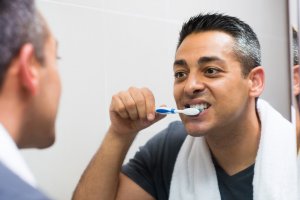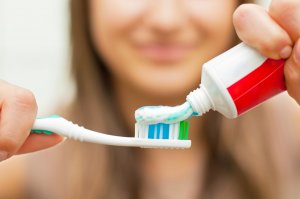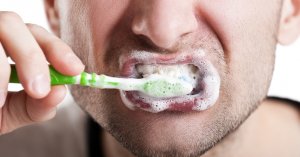Are you wondering how to brush your teeth properly? Brushing our teeth is something most of us have done for as long as we can remember, but often without much thought as to how to do it correctly. Well, it’s great that you’re giving it some thought now! Keeping your teeth clean is a very important part of maintaining overall good oral hygiene.
This detailed guide has all you need to know about how to clean your teeth. We answer some common questions including:
- How long to brush for
- How often to brush and at what times of day
- Whether to floss before or after brushing teeth
- Whether to rinse after brushing
- How to choose the best products for your oral hygiene routine
- Tooth brushing mistakes to avoid
You might be surprised to find that you haven’t been brushing your teeth quite right all these years, but we hope this guide helps you start using the correct technique.
Common questions about teeth brushing
We’re going to begin with some specific questions that people often have about the correct way to brush teeth. Then, you’ll find detailed step-by-step instructions on how to brush your teeth, followed by some more tips for keeping your teeth and mouth healthy.

Please note that this guide focuses mainly on teeth brushing for adults. Although much of this information also applies to children, we recommend you read our guide to children’s oral health if you want to check how to brush your child’s teeth. Also note that your dentist may give you slightly different advice according to your own oral health. Of course, you should always follow what your dentist recommends.
Ok, so let’s take a look at some FAQs about brushing teeth.
How many times a day should you brush your teeth?
You should brush your teeth at least twice a day. It is possible to over-brush your teeth, but this is more likely a result of bad technique than brushing too often.
One thing’s for sure: only brushing teeth once a day is not enough to keep them clean. Once-a-day brushing gives the bacteria in dental plaque too long to eat away at the surface of your teeth, meaning an increased likelihood of teeth cavities.
Despite this, 39% of 25-34-year-olds in the UK admit to brushing less than once a week, according to a survey by Hive Business.
When should you brush your teeth?
Brush your teeth before going to bed, and at least one other time during the day. For most people, this will be in the morning, either before or after eating breakfast. It’s fine to brush more often than this – perhaps after lunch as well – provided you’re brushing your teeth correctly.

It’s important to have clean teeth before bedtime because while you’re asleep, there is less saliva in your mouth to fight any bacteria that remain. However, 70% of people who only brush once a day say they do so in the morning, rather than the evening.
You might be surprised to hear that the best time to brush your teeth is not immediately after eating – especially if you’ve had very acidic or sugary food or drink. This is because sugar and acid weaken tooth enamel, and you may damage your teeth by brushing them when they have just been exposed. Instead, rinse your mouth with water straight after eating and brush your teeth 30-60 minutes later.
How long should you brush your teeth for?

Two to three minutes is the recommended teeth brushing time. Any less than this and you won’t have time to clean every surface of every tooth properly. Brushing your teeth for longer isn’t necessarily a good thing, as you might cause damage to your teeth and gums from over-brushing.
But it’s really important to concentrate on what you’re doing during those few minutes. Develop a brushing routine – like the one given below – and stick to the same pattern every day. Don’t let yourself get distracted, otherwise you could spend five minutes brushing the same few teeth and not even realise it.
If you know you struggle with concentrating on your brushing, you can always get a smart electric toothbrush with an app that tracks how you brush and helps you improve your technique. The Oral-B Genius X is the most advanced model out there, but you can discover more of the best Oral-B electric toothbrushes here.
Should you floss before or after brushing?
The NHS and the Oral Health Foundation both recommend flossing before brushing teeth since this helps clean the surfaces between the teeth, making the fluoride in toothpaste more effective. However, there is also a case for flossing after you brush, as this helps spread fluoride between the teeth.
Either way, the important thing is that you do floss regularly. Most Brits don’t.
Should you rinse after brushing your teeth?
No – and this is something that many people don’t realise. If you rinse after brushing, you wash away the fluoride in your toothpaste which is there to help fight decay and strengthen your teeth. Spit but don’t rinse, and the fluoride stays on your teeth for longer.
Should you brush your tongue?

Cleaning your tongue helps combat bad breath and lower the amount of bacteria in your mouth. Brushing your tongue with a toothbrush is not as effective as using a tongue scraper, though. The special design of tongue scrapers also makes them less likely to trigger your gag reflex.
Read more about the benefits of cleaning your tongue, how to do it, and the different products you can use in our guide to the best tongue scrapers in the UK.
Should you brush your gums?
No, you don’t need to brush your gums separately from your teeth. The part most at risk is the gumline, where your gums meet your teeth. Brushing teeth at a 45 degree angle will clean along the gumline.
You might need to visit the hygienist for a scale and polish to remove any tartar that’s already built up on your teeth, otherwise you risk developing gum disease.
Is it ok to chew gum instead of brushing your teeth?
Although it’s not a substitute for brushing your teeth, chewing sugar-free gum after eating can help prevent cavities. It makes you produce more saliva, which fights acids that can damage your teeth. It may also help to dislodge food particles.
Remember to choose a sugar-free variety, otherwise you’re just coating your teeth with even more damaging sugar. And use it in addition to – not instead of – twice-daily brushing.
How do you know if you’re doing it right?
Your teeth should feel clean and smooth after you brush, but there still might be plaque hiding along the gumline or between the teeth which you’re not aware of.
Did you know there is a way to see the plaque left on your teeth and around your mouth after you brush? Plaque disclosing tablets dye plaque a bright colour so you know if you’re brushing your teeth effectively. Once you know which bits you’re missing, you can make an effort to improve your technique. Read more about plaque disclosers here.
How to brush your teeth: step-by-step guide
We’ve established that you should brush at least twice a day, one of those times before you go to bed, for two to three minutes each time. Here’s what to do in those few minutes as you brush your teeth:
Use the correct amount of fluoride toothpaste

Use a soft-bristled toothbrush that fits easily in your mouth, so you can reach everywhere you need to brush.
The toothpaste doesn’t need to cover the brush head, like you see in many toothpaste ads. A pea-sized amount is enough for anyone over 3 years of age. These are the fluoride concentrations recommended by the NHS:
Age | Fluoride concentration | Amount to use |
Children under 3 | At least 1000ppm | A smear |
Children 3-6 | At least 1000ppm | A pea-sized amount |
Children over 6 and adults | 1350ppm – 1500ppm | A pea-sized amount |
Angle the brush at 45 degrees
When brushing the sides of your teeth, tilt your brush 45 degrees so that the bristles can reach inside the small gap between your teeth and gums. If plaque builds up in this pocket, it can lead to gum disease.
Brush gently with small circular motions
Many people brush their teeth using a back-and-forward scrubbing motion, but small circular movements are more effective and less damaging.
You also don’t need to exert a lot of pressure, or scrub as hard as you can. Gentle pressure is enough to loosen plaque, and if you brush too hard you might make your gums bleed. Many electric toothbrushes come with a pressure sensor which alerts you if you’re brushing your teeth too forcefully.
Brush every surface of every tooth
The order in which you brush your teeth doesn’t matter, but doing it the same way every time can help ensure you don’t miss any surfaces. This is one example of how you can brush your teeth:
- Begin at the back of your mouth, top left or top right
- Work your way around the outer surface of each tooth, brushing each one in small circular motions for a few seconds
- Turn your brush to the inner surface and work your way around the top again
- Brush the biting surface of your top molars and the back surface of your rear teeth
- Turn the brush vertically and use a downwards motion to brush the back of your front teeth a few times
- Repeat for the bottom teeth
- After cleaning your teeth, brush or scrape your tongue a few times
Another way is to break your mouth into four quadrants and spend 30 seconds on each one, brushing the inner, outer and biting surfaces as you go.
Spit but don’t rinse
Remember, if you rinse with water or mouthwash straight after brushing your teeth, the ingredients in your toothpaste get diluted or washed away. If you choose to use mouthwash then wait a while after brushing, or use it to freshen up at other times of the day when brushing isn’t possible.
Clean between teeth once a day
You don’t need to do this every time you brush, but cleaning between your teeth daily will help keep plaque at bay. You can use string floss, interdental brushes or a water flosser to do this.
Video showing how to brush teeth
This short animation from Bupa sums up the best way to brush teeth:
Choosing the right products for cleaning your teeth
Now you know how to brush your teeth, you might be wondering which products are best to use. Here are some things to consider, but you’ll find more information in our more detailed guides on each of these topics.
Toothbrush

You might think that scrubbing vigorously with a hard-bristled toothbrush will help remove more plaque, but in fact it can be damaging to your teeth and gums. Soft or medium bristles should do the job just fine. Choose a small brush head that lets you reach your back teeth easily.
An electric toothbrush may help you brush your teeth more effectively. Read about why this is and how to choose the best one for you in our electric toothbrush guide. Still, the best manual toothbrushes are effective at removing plaque when used correctly.
You should replace your toothbrush or brush head every 3 months, or sooner if you notice the bristles are splaying (this could be a sign you’re brushing too hard). Using an old, frayed brush may damage your enamel.
Toothpaste
Using a toothpaste that contains fluoride (at least 1,350 ppm for adults and children over 6) helps you fight decay as you brush. Choose a brand and flavour that you enjoy using, as this will make you more likely to keep up regular brushing. You can read some of our recommendations for the best toothpastes in the UK here.
Natural toothpastes with and without fluoride are available to buy, and you can even make your own if you prefer.
Floss
Brushing teeth only cleans three out of the five surfaces, so it’s important to clean between them as well. If you don’t like using traditional dental floss, or if you have braces, interdental brushes or a water flosser can make the job a lot easier. There’s more about all these options and how to floss properly in our separate guide.
Mouthwash
Mouthwash doesn’t just freshen your breath; choose one that contains fluoride and it’ll also work to prevent tooth decay. However, you shouldn’t use it straight after brushing because it rinses off the fluoride left from your toothpaste. There are some options that are fluoride-free, with more natural ingredients on the market. Navigate your way through different options in our best mouthwash guide.
Other ways to care for your teeth
Making sure you clean your teeth properly is only part of the picture when it comes to maintaining good oral health. Here are some other things you can do to make sure your new teeth brushing efforts are not going to waste.
Watch what you eat

You know that eating sugar is bad for your teeth, but there’s a lot more to it than that. Acidic foods and drinks like vinegar, pickles, fruit juice, wine and soft drinks can be just as damaging. Plus, a lot of “healthy” snacks like dried fruits, cereal bars and yoghurts contain more sugar than you might realise.
The damage increases if you snack regularly on these culprits throughout the day, rather than limiting them to mealtimes. Constant grazing means your teeth don’t get a break from the sugar and acid which wear away enamel.
Not only does this result in greater risk of tooth decay; you may also develop dental sensitivity or yellow teeth because of thinning enamel.
Have regular dental checkups
Even if you know how to brush your teeth properly and follow a good oral hygiene routine every day, dental problems can still occur. Having regular checkups lets your dentist catch these early on and means treatment should be less invasive (and less expensive) than if you leave the problem to develop.
Your dentist will also give you advice on the best way to brush your teeth and care for your overall oral health, so don’t be tempted to skip your checkups!
One of the most important things you can do for the health of your child’s teeth is daily tooth brushing. Don’t ever underestimate the power of this simple, two-minute act for oral hygiene efforts. Oral health starts with a commitment to regular tooth brushing and flossing.
- Engage in tooth brushing twice a day with a soft-bristled brush. The size and shape of a toothbrush should accommodate the size of your child’s mouth allowing you to reach all areas easily.
- Use the right amount of toothpaste: Rice-sized amount for babies; pea-sized amount for toddlers.
- Replace toothbrushes every three or four months–sooner if bristles are frayed. A worn-out toothbrush isn’t a good tool for cleaning teeth.
- Parents should help supervise children when they brush their teeth until age 11.
Dr. Catalina Botero, Li’l Sunshine Smiles Dentistry
Conclusion
We hope you have found these oral hygiene instructions useful and you now understand how to brush your teeth properly. Perhaps it’s highlighted some things you were doing wrong?
Remember, keeping your teeth clean and healthy involves:
- Brushing at least twice a day, for two minutes at a time
- Using a soft-bristled toothbrush and a fluoride toothpaste
- Not rinsing after you brush (even with mouthwash)
- Not brushing teeth straight after eating acidic or sugary foods and drinks
- Avoiding snacking on sugary and acidic foods and drinks
- Flossing daily
- Visiting your dentist regularly
If you’re still unsure about how to clean your teeth properly or you have any other concerns, speak to your dentist at your next visit.
Oral Health Foundation: Diet and my teeth. Consulted 26th August 2019.
Oral Health Foundation: Caring for my teeth and gums. Consulted 26th August 2019.
NHS: How to keep your teeth clean. Consulted 26th August 2019.
Hive Business: Survey results reveal common hygiene habits. Consulted 21st June 2022.




